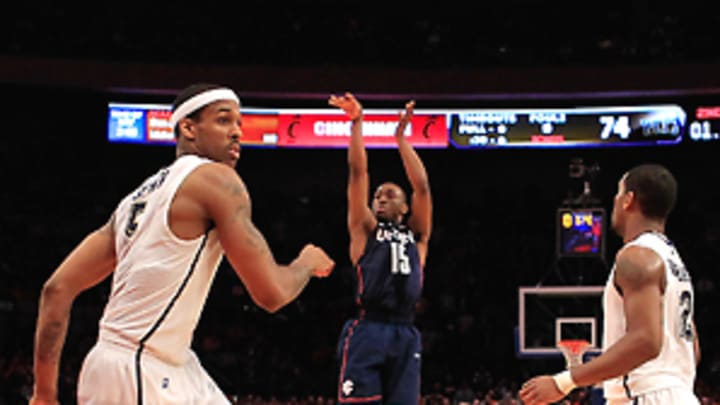UConn's Walker etches himself into Garden lore with buzzer-beater

He knew he'd keep the ball for the last shot. ("Everybody in the world knew," he said.) He knew Pittsburgh big man Gary McGhee would wind up switching to guard him. The shifty 6-foot-1 point guard knew with enough moves, he'd eventually get the 6-11 center off his feet in time to take the game winning shot -- though he obviously didn't know he'd juke McGee so badly he'd actually fall down.
"I was going to go to the basket on him," said the first team All-America contender. "I was going to penetrate and get a layup or get a [shot] for a teammate, but he fell so I was able to get a clean look at the rim. So I took my shot."
Walker drained that open, stepback jumper from just inside the arc as the game clock expired to give the ninth-seeded Huskies a 76-74 win over No. 1 seed Pittsburgh in Thursday's Big East quarterfinal. The sixth game-winning shot of Walker's career came on his biggest stage to date. UConn still needs two more wins to claim the trophy here, but Walker has already etched himself into Madison Square Garden lore, scoring 26, 28 and 24 points in wins over DePaul, Georgetown and now the 27-5 Panthers.
"Kemba has made a ton of big shots this year," Huskies coach Jim Calhoun said. "He's the most important guy for a single team in college basketball."
It didn't matter that Walker had missed his previous four shots, hitting just seven of his 21 attempts on the day. It didn't matter that just moments earlier, he'd short-armed a closer, open look that would have put his team back on top of a tense, back-and-forth contest. (Walker was saved by an offensive rebound and ensuing timeout by teammate Jamal Coombs-McDaniel.)
"Game-winning shots -- it's my time," the junior said. "My teammates told me to stay aggressive, to go out and win the game."
Calhoun said the play was designed specifically to create a Walker vs. McGhee matchup. "He made a [play] we'd been working on," the coach said. "We'd seen other teams do the same type of thing [against Pitt]." Unlike the final seconds last Saturday in Storrs, when four Notre Dame defenders collapsed on him, forcing him to give up the ball (the Huskies fell 70-67), UConn created space for him by not only setting a screen at the top of the key but flaring out Coombs-McDaniel for a possible three-point attempt. "He'd made two threes yesterday, [one three] the day before, so they had to honor that," Calhoun said. "They had to play the shooter and try to play Kemba with the big, and we thought the advantage was to us."
Umm, yes.
Pitt, playing its first game of the week, had stormed to an early 33-21 lead and looked every bit the crisper, rested team. But Connecticut forced several turnovers to help wipe out the deficit before halftime, actually going up 41-40 before a Travon Woodall layup gave the Panthers the lead back at intermission. The second half was tight throughout, with Pittsburgh building a seven-point lead only to see the Huskies fight back again. UConn led 74-71 with 50 seconds left when Panthers star Ashton Gibbs -- whose own huge game consisted of 27 points on 10-of-13 shooting -- drained a game-tying three-pointer from the corner.
Unfortunately, that left ample time for his star-studded adversary to one-up him.
Walker knows it's cliché to say he knew it was good as soon as the ball left his hands -- but he did. "A lot of times I wouldn't tell you I knew it was in," he said. "But this time, it felt pretty good."
It felt even better when, after the shot went down, Walker turned and roared to the crowd as seven teammates engulfed him and forward Roscoe Smith -- bandage on the side of his face from a first-half elbow that mandated stitches -- wrapped his arms around Walker's chest and practically carried him off the court.
After losing four of their last five regular-season games to finish 9-9 in the conference and be forced to play this tournament without a bye, Walker and the Huskies have regained the swagger they had back when they started 10-0 and their star was draining daggers against the likes of Michigan state and Texas. Friday night, they'll attempt to become just the second team in tourney history to win four games in four days. (Syracuse, behind similar last-second heroics from Gerry McNamara, did it in 2006.)
Even if they don't, they likely bumped themselves up at least a spot on the selection committee's S-curve by beating the nation's third-ranked team. For their part, the loss could cost the Panthers a No. 1 seed, depending on other contenders' results, though coach Jamie Dixon tried to downplay the possibility.
"Obviously in a game that we led for most of the game, I don't think this will have a big effect on it," he said. "One game doesn't change what we did the other 31."
The effect on UConn remains to be seen. Syracuse's memorable 2006 run left McNamara so drained that the Orange bowed out in the first round of the NCAAs. To this point, the Huskies appear to be rejuvenated, and after playing three games in a 50-hour span, they at least get a break until 7 p.m. Friday night.
"These noon games are though, I'm not gonna lie," Walker said. "But we're winning. I'm not complaining at all."
Nor is anyone who's gotten to watch his heroics in person this week.
